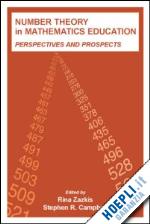This book offers multiple interconnected perspectives on the largely untapped potential of elementary number theory for mathematics education: its formal and cognitive nature, its relation to arithmetic and algebra, its accessibility, its utility and intrinsic merits, to name just a few. Its purpose is to promote explication and critical dialogue about these issues within the international mathematics education community. The studies comprise a variety of pedagogical and research orientations by an international group of researchers that, collectively, make a compelling case for the relevance and importance of number theory in mathematics education in both pre K-16 settings and mathematics teacher education.Topics variously engaged include:*understanding particular concepts related to numerical structure and number theory;*elaborating on the historical and psychological relevance of number theory in concept development;*attaining a smooth transition and extension from pattern recognition to formative principles;*appreciating the aesthetics of number structure;*exploring its suitability in terms of making connections leading to aha! insights and reaching toward the learner's affective domain;*reexamining previously constructed knowledge from a novel angle;*investigating connections between technique and theory;*utilizing computers and calculators as pedagogical tools; and*generally illuminating the role number theory concepts could play in developing mathematical knowledge and reasoning in students and teachers.Overall, the chapters of this book highlight number theory-related topics as a stepping-stone from arithmetic toward generalization and algebraic formalism, and as a means for providing intuitively grounded meanings of numbers, variables, functions, and proofs.Number Theory in Mathematics Education: Perspectives and Prospects is of interest to researchers, teacher educators, and students in the field of mathematics education, and is well suited as a text for upper-level mathematics education courses.












